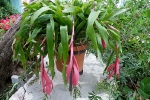It is a lively, persistent, or epiphytes plant that grows on rocks. It reaches up to 100 cm tall and wide. Rosettes are large, compact forms. Having long leaves, thin ribbons which form more or less rigid to them, they may harsh. Those indoor plants are colored in gray green. With small, unscented, of tubular shape, ephemeral flowers are colored blue or violet. They are protected by large red or pink bracts and most of the time their inflorescence often form by their own independence.

Having the common name of ‘Queen Tear’ and a synonym of ‘Billbergia elegan’, this indoor plant is a type of exotic flower. They live up to 5 years, flowering throughout the year.
Queen’s Tear origin is Brazil, Uruguay and even Argentina, so they have a tropical habitat. It is likely to have a reduced humidity and a temperature somewhere between 10-25 ° C. The brightness must be at the middle, half in shadow and half in the sun.
Soil type: suitable substrate is composed of equal parts of peat moss, leaves and sand. They prefer slightly acidic soil but tolerate alkaline soil as well.
Fertilizer: During April to September must be fertilized with liquid fertilizer for orchids. Apply it with watering weekly.
Propagation: Propagation is made by planting individual separation and shoots which are formed from the mother’s plant. They will not be separated before reaching 20 cm height.
Pests and diseases: excess moisture and rotting leaves cause massive diseases for the plant. Occasionally, the adequate care can not be appealed co senile and lice.
Care: Prefers bright light to stimulate flowering but I can not stand in direct sun. It is must to be wet every 7-15 days depending on the season and room temperature. It removes excess water from the pot tray. A plant is sensitive to air dry and dark atmosphere till suffocating. For the best of the plant, ventilate the entire room where the plant is located and spray the leaves daily with water on hot days. Make the spring transplant only if bush has become voluminous and the pot too small.
Benefits: They are exotic plants, particularly decorative flowers and bracts of various shades. Even tough, it has a fast growth rate. If you do not remove shoots first and leave the plant as a bushy shrub, it becomes more spectacular when flowering. This indoor plant can be grown as epiphytes on the bark of shrubs plant.
Billbergia Nutans Queen’s Tear Pictures Gallery



